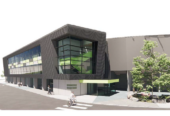
Smart Environmental’s managing director Grahame Christian
As the full effects of China’s decision to stop importing recycled rubbish from the West kicks in, the backlog of recycled waste at the Smart Enviromental plant near Thames is steadily growing, with Cambridge’s rubbish adding to the pile.
Smart Environmental’s managing director Grahame Christian said there is roughly 4,000 tonnes of recycling piled up at the facility, which takes waste from Waipa, North Waikato, Matamata/Piako, Hauraki, Thames Coromandel and Rotorua. And there are five other plants throughout the country facing the same issue.
While China is not the only country importing recycled material to process, it was the main player and its decision to stop imports has had a knock-on effect throughout the Western world. While they had tightened up the industry in the past, “no one believed China would totally shut the door,” Grahame said. But they did. From January 1, China banned the import of all plastics, slag, unsorted waste paper and textiles for environmental and health reasons, meaning $21M of New Zealand’s waste will need to go somewhere else or face the landfill.
Grahame said China has the infrastructure set up to process the recycling, describing the scale of the operations over there as “astounding”, however one of the drivers behind the decision was the frequent mislabelling of waste being sent to China. “Some American companies were putting contaminated waste into containers and labelling it as recycling,” Grahame explained, adding this meant the Chinese resorted to disposing of the unusable waste into landfill, rivers or the sea. “I understand them not wanting to be the world’s rubbish dump.”
While this is not the end for recycling, China’s move has meant the price paid per tonne of mixed plastics, such as ice cream containers, has plummeted from $130 per tonne to zero, so sending the recycling away will cost money rather than earning it.
Waipa District Council’s general manager, service delivery, Barry Bergin, said that councils around the country are dealing with the issue. “We’re in ongoing discussions with Smart Environmental which is contracted to collect our recycling until February next year. We have some time to look at options and are doing that now,” he said.
Grahame said he hopes this backlog will encourage New Zealanders to look at the bigger picture.
“Our consumption of plastic is frightening, and people need to think seriously about what they’re buying, instead of thinking it’s (the rubbish) is someone else’s problem.”
It’s a message echoed by Barry, who pointed out that consumers hold the real power because they make purchasing decisions. “We’ll only reduce the use of plastics if we change buying behaviour. We’d like people to think hard before they buy products in single use containers. If they really do need to buy them, can they buy in bulk for example? Can the containers be reused before they are finally recycled? It’s that kind of behaviour change that will make the real difference in the long-term.”
Currently Waipa’s glass goes Auckland for recycling, and cardboard goes to Kinleith Mill for reuse. There’s a stable and local market for aluminium, tin and steel. Mixed paper is also problematic and that is currently being stockpiled although other markets may open up, Barry said.









